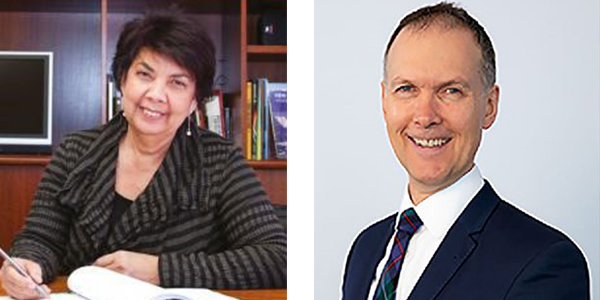1:30min

Dr Dawn Casey and Emeritus Professor Paul Worley
By Helen Carter
Journalist
Optometry Australia is supporting members to connect during the unprecedented coronavirus pandemic, using online discussion groups to link optometrists practising in rural and remote areas, and those who provide services to Aboriginal and/or or Torres Strait Islander communities, with their colleagues.
Policy and Advocacy Manager Sarah Davies said the special interest group discussions would include presentations from experts in rural health and Aboriginal and Torres Strait Islander health, providing updates on responses to COVID-19 and priority areas.
Both one-hour online meetings are free and open to all Optometry Australia members. Attendees will be allocated one non-clinical, non-accredited CPD point per meeting.
The Rural optometry during COVID-19 online discussion will be held from 7.30-8.30pm AEST on Tuesday, 9 June 2020 and members are invited to register here.
The Aboriginal and Torres Strait Islander eye care during COVID-19 online discussion will be held from 3.00-4.00pm AEST on Thursday, 11 June 2020 and members are invited to register here.
Optometry care in rural communities during COVID-19
‘Optometrists work in a variety of ways in rural and remote Australia, most commonly through an established optometry practice,’ Ms Davies said. ‘Outside of this, some optometrists provide sessional services at regional hospitals or other local health services, or visiting services through other community hubs.
‘Naturally, all of these settings have been impacted in different ways by the pandemic, and as a result our 2020 special interest group discussion will focus on providing our members the opportunity to raise and discuss the emerging issues they are facing.’
The rural health special interest group discussion will include presentations on current priorities from key rural health stakeholders, including the National Rural Health Commissioner, Emeritus Professor Paul Worley and a representative of the National Rural Health Alliance.
Professor Worley has had a distinguished career in rural health, as a rural GP and an academic. A former Dean of Medicine at Flinders University, he established Rural Clinical Schools and University Departments of Rural Health in South Australia and the Northern Territory and guided the conceptualisation and development of the Northern Territory Medical Program with a focus on recruiting and supporting Indigenous students and staff.
In November 2017, Professor Worley was appointed as Australia’s first National Rural Health Commissioner, responsible for undertaking broad-scale consultation with the rural and allied health sectors at a national, jurisdictional and local level. In this capacity, Professor Worley presented an Interim Report outlining recommendations to improve the access, quality and distribution of allied health services in regional, rural and remote Australia to Minister for Regional Health, Regional Communications and Local Government, the Hon Mark Coulton MP, in March 2020, with a final report due in June 2020.
The National Rural Health Alliance represents 44 national organisations, including Optometry Australia, working to improve the health and well-being of seven million people in rural and remote Australia.
Ensuring eye care services for Aboriginal and Torres Strait Islander communities during COVID-19
‘Over the past decade, the gap in eye health and vision for Aboriginal and Torres Strait Islander people has halved,’ Ms Davies said.
’However, too many Aboriginal and Torres Strait Islander people still experience avoidable vision loss and blindness, and those who have lost vision often find it difficult to access the support and services they need.
‘Optometry is critical to the ongoing effort to close the gap in eye health outcomes; however, these efforts have been and continue to be impacted by the COVID-19 pandemic.
‘This special interest group discussion aims to provide optometrists working in this area with the opportunity to engage with each other, and Optometry Australia, on the opportunities and challenges in providing eye care to Aboriginal and Torres Strait Islander communities during the pandemic.’
Dr Dawn Casey, deputy CEO of the National Aboriginal Community Controlled Health Organisation (NACCHO) will provide an update on the Aboriginal and Torres Strait Islander community-led response to COVID-19 and overview current priorities in Aboriginal and Torres Strait Islander health more broadly.
NACCHO is the national peak body representing 143 Aboriginal Community Controlled Health Services (ACCHSs) across the country on Aboriginal health and wellbeing issues.
Dr Casey, a descendant of the Tagalaka clan in North Queensland, has previously held full-time positions as Director of the Western Australian, Powerhouse and National museums. Her career includes key executive positions in the Department of Prime Minister and Cabinet, Indigenous Affairs, Cultural Heritage and Overseas Aid and Development.
She has been awarded three Honorary Doctorates, the Commonwealth Government’s Public Service Medal, the Australian Government’s Centenary Medal, three Australia Day Public Service Medals and is a Fellow of the Australian Academy of the Humanities.
Tagged as: COVID-19, Indigenous eye health, Remote & rural optometry